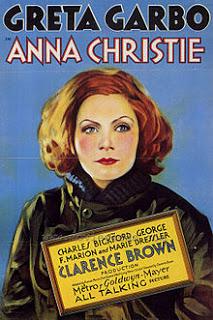
Directed By: Clarence Brown
Starring: Greta Garbo, Charles Bickford, George F. Marion
Tag line: "Garbo talks!"
Trivia: Both an English and a German language version of this film was produced, with Garbo starring in both
“Garbo talks!”
That’s what the posters for 1930’s Anna Christie screamed, and for moviegoers at the time, this was reason enough to see it. A star in the 1920s, Garbo, like Charlie Chaplin, continued to appear in silent pictures after the rest of Hollywood had switched to talkies. So, the chance to finally hear one of the cinema’s biggest and brightest speak on-screen helped make Anna Christie a very popular film that year (it set 1st and 2nd week box office records at New York’s Capitol Theaters, on its way to grossing $1 million during its U.S. run). But while it was the novelty of sound that drew audiences to Anna Christie, it was Garbo’s electrifying performance that stayed with them well after the movie ended.
While at a dockside bar with his live-in companion Marthy (Marie Dressler), Chris Christofferson (George F. Marion), the captain of a New York coal barge, receives word that his estranged daughter Anna (Garbo) has left St. Paul, Minnesota (where she spent that last 15 years living with relatives), and is on her way to see him. Following a heartfelt reunion, an ecstatic Chris invites Anna to stay with him on the barge for as long as she likes. But his happiness at having her back in his life soon turns to concern when Anna strikes up a relationship with Matt (Charles Bickford), a boisterous Irish sailor they pulled out of the water one foggy evening (he and the rest of his crew were stranded when their ship was damaged). Believing sailors make the worst husbands, Chris does everything he can to break the couple up, but it’s a secret from Anna’s past that may drive the lovestruck Matt away once and for all.
It isn’t until 15 minutes into the film that Garbo makes her grand entrance; the opening scenes feature the equally versatile Marie Dressler, whose drunken antics add a bit of comic relief (in need of more whiskey, she and Chris wobble into town, stumbling all the while as they walk across the gangplank). After receiving word that Anna will be arriving soon, Chris heads to a nearby restaurant to get something to eat (to sober himself up), and it is then that Garbo first appears. Walking slowly into the bar, she sits at a table and orders a drink from the barkeep, Larry (Lee Phelps):
“Give me a whiskey, ginger ale on the side. And don’t be stingy, baby”.
Picture Play magazine said it was “The voice that shook the world”, while the New York Herald Tribune’s Richard Watts, Jr. described it as a “husky, throaty contralto”. To be sure, audiences at the time were most likely stunned to hear such a deep voice emanating from Garbo’s petite frame, but that shock wouldn’t have lasted long; soon enough, it was Garbo’s performance that grabbed their attention, and throughout Anna Christie, she’s at her mesmerizing best.
It was a role tailor-made for Garbo, that of a woman who, time and again, has experienced the worst in men (Anna drops hints that, during her stay in Minnesota, one of her male cousins raped her, and confesses to Marthy that, for the last two years, she worked at a brothel), and is convinced she will never find love. That changes, however, when Matt enters the picture. Intent on making Anna his wife, Matt does everything he can to win her affections (in what is the only sequence not set along the New York docks, Anna and Matt enjoy a fun-filled day at Coney Island), but Anna knows that if the truth about her past is revealed, it will likely drive him away. And because she, in turn, has feelings for Matt, the thought of losing him weighs heavy on her mind.
Based on an award-winning play by Eugene O’Neill, Anna Christie is undoubtedly stage bound (most of the movie takes place on two sets), and the sound is mediocre at best (not a surprise, seeing as the technology was new at the time). As for the supporting cast, Marie Dressler stands out in the few scenes in which she appears, infusing the oft-inebriated Marthy with plenty of character, and just the right amount of worldly wisdom (despite their thick, often cartoonish accents, both Bickford and Marion are also quite good as the men in Anna’s life). But audiences went to Anna Christie for one reason and one reason only: to both see and hear Greta Garbo, and as she would do many times over the years, the actress gave it her all, and then gave a little more.
